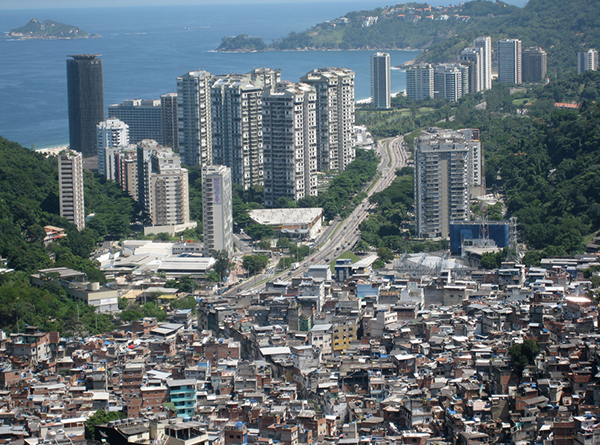NEWSLETTER
|
President's Message, Spring 2014
Clearly not, except in some outward manifestations, most notably the segregation that marks the boundaries between black inner-city and white suburbs in Detroit and between the hillside slums, inhabited by people of color, often black, and the middle class and wealthy neighborhoods pinched between Rio’s mountains and the sea. Corruption, drug trafficking, crumbling infrastructure, failing public services, widespread public insecurity and disregard for governing institutions are other surface similarities, but the comparisons end there. Unlike Detroit, Rio is far from broke, but its spirits have been severely dampened.
Rio’s colonial and imperial past are a sharp contrast to Detroit’s. Instead of a brisk trading post that evolved into a formidable industrial engine fueling the growth of a once dynamic and thriving middle class, Rio was founded with the trappings of European courtly life, sustained by a wicked slave trade that outlasted any other in the world and gives the “marvelous city” the dubious distinction of having imported more slaves than any other port of entry.
When Brazil became a republic in the late 19th Century, Rio became its default capital, but title, privilege and autocracy remained its dominant features. Those halcyon years lasted until 1960 when the political capital moved to the neo-modernist Brasilia and the economic capital moved south to Brazil’s true Detroit, São Paulo, where automobile assembly plants and blue-collar labor unions became emblematic of a more energetic Brazil.
Rio’s half century of subsequent neglect took its toll on a city sapped of its energy. Small-bore politics and a service economy kept the city alive while successive rural-urban migrations from the impoverished northeast swelled the hillside slums, encircling the city with poor, under-served communities that became the seedbeds for drug trafficking and rival gang warfare. After a brief moment of euphoria fueled by seabed oil discoveries, speculative real estate and Rio’s designation as host city for the World Cup soccer games starting in June and for the 2016 summer Olympics, the city now finds itself in the doldrums. The brief economic spurt, easy credit and government income transfers lifted millions of Brazilians out of poverty, but their mobility has been eroded by rising inflation that now ranks Rio among the most expensive cities in the world.
The discontent is everywhere, evident in almost daily strikes of sanitation workers, bus and taxi drivers, bank guards, civil police and teachers. Street demonstrations have resulted in the looting and depredation of buses and public buildings. Shoot-outs between drug traffickers and police are again a daily occurrence in hillside communities supposedly cleansed of gangs, and street crime is rampant.
Sullenness has settled on Rio’s population, the Cariocas, known for their joyfulness, love of samba and soccer, and hospitality. Streets normally festooned for soccer-league championships are devoid of decoration, and chants of "there will be no COPA” (World Cup games) decry the billions spent on stadiums rather than schools, public transportation, health and security.
As in Detroit, extraordinary social entrepreneurs work tirelessly in the hillside communities to provide services and opportunities that the government leaves wanting. And neighborhood associations implore the government to clean the streets, remove the garbage, provide refuge for the homeless and deploy more and better policing. But unlike the efforts described so well by James Kelly and Jon Funabiki in this issue, there are no civic leaders or public-private partnerships or foundations of scale pushing the government to do the right thing. There’s a lot that Rio, despite the differences, can learn from Detroit.
_______
Each of my messages has become a lamentable noting of the passing of colleagues, this time of my dear and greatly admired friend, Peter Bell. We have all left our proud marks on the Foundation and will be remembered in our own way for our efforts, but Peter was singular in his courage and persistence during the darkest days of the Latin American military dictatorships, one of the most lustrous moments in the Foundation’s history. His obituary in this newsletter merits a quiet and reflective read.
|


